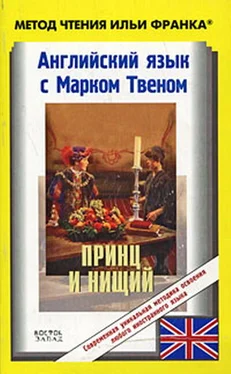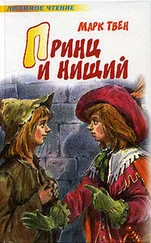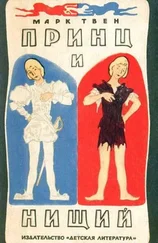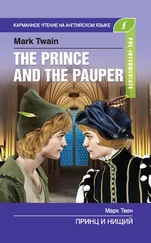It was easy to think this (было легко подумать это); but it was hard to brace himself up (но было тяжело собраться с духом; to brace up — собраться с духом) to try it (попробовать это). Three times he stretched his hand (три раза он вытягивал свою руку) a little way out into the dark (небольшой путь = недалеко во тьму) gingerly (осторожно); and snatched it suddenly back (и отдергивал ее внезапно обратно; to snatch — хватать), with a gasp (с выдохом = задыхаясь от ужаса) — not because it had encountered anything (не потому, что она встретила что-то), but because he had felt so sure it was just going to (но потому, что он чувствовал так ясно, что она собиралась (встретить); sure — уверенный). But the fourth time he groped a little further (но в четвертый раз он пощупал немного дальше), and his hand lightly swept against something soft and warm (и его рука легко дотронулась до чего-то мягкого и теплого; to sweep — дотрагиваться рукой). This petrified him nearly with fright (это почти привело его в оцепенение от ужаса; to petrify — делать камнем) — his mind was in such a state (его рассудок был в таком состоянии) that he could imagine the thing to be nothing else (что он мог представить себе эту вещь не чем иным) than a corpse (как трупом), newly dead (недавно мертвым = только что погибшим) and still warm (и все еще теплым). He thought he would rather die (он подумал, что скорее умер бы; to think — думать) than touch it again (чем дотронулся до него снова). But he thought this false thought (но он думал эту ложную мысль) because he did not know the immortal strength of human curiosity (потому что он не знал бессмертную силу человеческого любопытства). In no long time (в недолгом времени = скоро) his hand was tremblingly groping again (его рука, дрожа, ощупывала снова) — against his judgment (против его суждения), and without his consent (и без его согласия) — but groping persistently on (но щупала настойчиво дальше), just the same (все так же). It encountered a bunch of long hair (он встретила пучок длинных волос); he shuddered (он вздрогнул), but followed up the hair (но проследовал по волосам) and found what seemed to be a warm rope (и нашел то, что казалось теплой веревкой; to find — найти); followed up the rope (проследовал вверх по веревке) and found an innocent calf (и нашел невинного теленка); for the rope was not a rope at all (ибо веревка была вовсе не веревкой), but the calf's tail (но хвостом теленка).
drowsy [`drauzı], mysterious [mıs`tıərıəs], calf [ka:f]
Although the king was hungry and chilly, he was also so tired and so drowsy that these latter influences soon began to get the advantage of the former, and he presently dozed off into a state of semi-consciousness. Then, just as he was on the point of losing himself wholly, he distinctly felt something touch him. He was broad awake in a moment, and gasping for breath. The cold horror of that mysterious touch in the dark almost made his heart stand still. He lay motionless, and listened, scarcely breathing. But nothing stirred, and there was no sound. He continued to listen, and wait, during what seemed a long time, but still nothing stirred, and there was no sound. So he began to drop into a drowse once more at last; and all at once he felt that mysterious touch again! It was a grisly thing, this light touch from this noiseless and invisible presence; it made the boy sick with ghostly fears. What should he do? That was the question; but he did not know how to answer it. Should he leave these reasonably comfortable quarters and fly from this inscrutable horror? But fly whither? He could not get out of the barn; and the idea of scurrying blindly hither and thither in the dark, within the captivity of the four walls, with this phantom gliding after him, and visiting him with that soft hideous touch upon cheek or shoulder at every turn, was intolerable. But to stay where he was, and endure this living death all night- was that better? No. What, then, was there left to do? Ah, there was but one course; he knew it well — he must put out his hand and find that thing!
It was easy to think this; but it was hard to brace himself up to try it. Three times he stretched his hand a little way out into the dark gingerly; and snatched it suddenly back, with a gasp — not because it had encountered anything, but because he had felt so sure it was just going to. But the fourth time he groped a little further, and his hand lightly swept against something soft and warm. This petrified him nearly with fright — his mind was in such a state that he could imagine the thing to be nothing else than a corpse, newly dead and still warm. He thought he would rather die than touch it again. But he thought this false thought because he did not know the immortal strength of human curiosity. In no long time his hand was tremblingly groping again — against his judgment, and without his consent — but groping persistently on, just the same. It encountered a bunch of long hair; he shuddered, but followed up the hair and found what seemed to be a warm rope; followed up the rope and found an innocent calf; for the rope was not a rope at all, but the calf's tail.
The king was cordially ashamed of himself (король сердечно = от всего сердца был пристыжен за себя) for having gotten all that fright and misery (за то, что испытал весь этот страх и страдание) out of so paltry a matter (из-за такого пустячного предмета) as a slumbering calf (как спящий теленок); but he need not have felt so about it (но ему не следовало так чувствовать себя из-за этого; to need — нуждаться; to feel — чувствовать), for it was not the calf that frightened him (ибо это был не теленок, что напугало его) but a dreadful non-existent something (но ужасное несуществующее нечто) which the calf stood for (за которое стоял теленок = что символизировал теленок); and any other boy, in those old superstitious times (и любой другой мальчик в те древние суеверные времена; superstition — суеверие), would have acted and suffered just as he had done (действовал бы и страдал бы прямо как он = испугался бы не меньше его).
The king was not only delighted to find (король был не только обрадован обнаружить) that the creature was only a calf (что это существо было просто теленком), but delighted to have the calf's company (но рад иметь общество теленка); for he had been feeling so lonesome and friendless (ведь он чувствовал себя настолько одиноким и лишенным друзей) that the company and comradeship of even this humble animal (что общество и товарищество даже этого смирного животного) was welcome (было желанным). And he had been so buffeted (и он был так обижен; to buffet — бить), so rudely entreated by his own kind (с ним так грубо обошлись его же соплеменники; to entreat — устар. обращаться; совр. знач. — умолять), that it was a real comfort to him (что это было ему настоящей отрадой) to feel that he was at last in the society of a fellow-creature (почувствовать, что он был наконец в обществе собрата; fellow — товарищ; creature — существо, тварь) that had at least a soft heart and a gentle spirit (которое имело по крайней мере мягкое сердце и тихий нрав), whatever loftier attributes might be lacking (каких бы более возвышенных = благородных качеств и не хватало; to lack — не хватать, не иметь). So he resolved to waive rank (так что он решил отвергнуть ранг = иерархию) and make friends (и подружиться) with the calf (с теленком).
Читать дальше
Конец ознакомительного отрывка
Купить книгу




![Марк Твен - Принц и нищий [Издание 1941 г.]](/books/148799/mark-tven-princ-i-nichij-izdanie-1941-g-thumb.webp)







